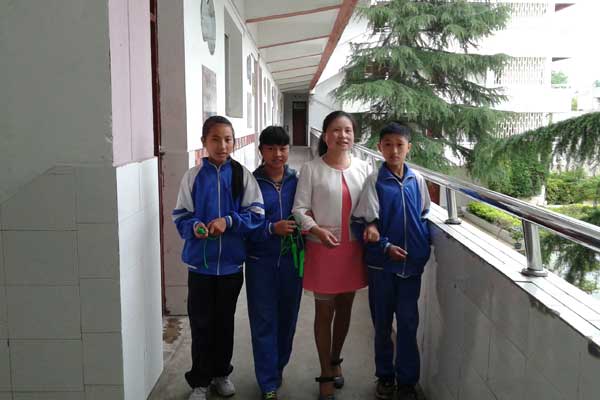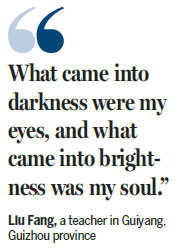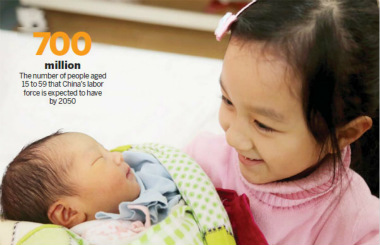Teacher finds fulfillment in the darkness
Updated: 2016-01-22 08:12
By Li Yang and Yang Jun in Guiyang(China Daily)
|
|||||||||||
 |
|
Liu Fang with her students at No 3 Middle School in Guiyang, Guizhou province. [Photo provided to China Daily] |
Despite being blind, she found a way to continue helping her students
Writer Liu Fang's first novel, about the life of a teacher at a rural school in the mountainous province of Guizhou in the 1990s, greatly resembles her own early years - before she lost her sight and struggled to find a full life in the darkness.

Liu, 44, was a Chinese language teacher at No 3 Middle School in the Baiyun district of Guiyang until 2006, when she could no longer see the characters printed in the textbooks.
Diagnosed with incurable retinosis, a degenerative eye disease, in 1997, Liu was told she would gradually lose her eyesight over 10 years, and the sense of light slowly after that.
"That it took me 20 years to walk into darkness qualifies me to tell you the difference between the two worlds," Liu said. "I spent the first 10 years adjusting myself to accept the agonizing reality, and the second decade facing the cruelty with smiles. I think I am a brave person."
Now a mental health worker at the middle school, she is quick to laugh and tell interesting stories about her life.
"I am a happy and forgiving person now," she said. "But 10 years ago, I was like a hysteric hedgehog, vigilant and aggressive to all signs and people that I thought would harm me or look down on me."
Liu had many people at her side. Her family and friends helped her overcome the most difficult period of her life. And her own kindness served her well.
"She likes giving me some little gifts, from snacks to daily necessities. I thought I should not accept her things anymore after she became blind, even though my salary is low," said Ma Xuezhong, a janitor who has worked in the school for 24 years.
"But she would swing the things in the air until I took them."
Liu praised the school's headmaster, who assigned her a new post as a psychological consultant for students, and arranged for professional training for her new role.
Many schools set up a required mental health office, but staff it part-time with teachers. Liu, on the other hand, truly embodies the job. Her office is a cozy nook, decorated with hand-drawn student pictures, one where children can thoughtfully talk about their problems.
"Liu takes her job seriously," said her colleague, Tang Mingrong. "She donated 5,000 yuan ($760) from her income from the novel to five poor students. After she became famous, all she asked from society was help for the "left-behind" children, instead of herself."
Yang Hui, a student who often quarrelled with her parents, said Liu feels like a mother to the students. "She would listen to me patiently, and she helped me find the reason I couldn't get along well with my parents," Yang said.
In this regard, Liu said, her blindness is an asset. "I guess they trust me because I cannot see them, and they feel I am more concentrated and careful than others while listening to them."
During the breaks between classes and at noon, students come to talk to her. Many are left-behind children from nearby villages, and she said their trust is the best reward for her commitment to her job.
Liu once liked reading, calligraphy, singing and dancing. She gave up these hobbies one after another as her eyesight declined. Writing took their place.
Last year, she published her first novel, Shiliu Qingqing, or Green Pomegranate, a fictional account of her early years. She now is writing a second book about the life of workers, like her father, who volunteered to help develop rural southwestern China.
"What came into darkness were my eyes, and what came into brightness was my soul," she wrote in the book's preface.
Contact the writers through liyang@chinadaily.com.cn
Today's Top News
China gives beleaguered Tsipras a helping hand
China and Gulf nations resume free trade talks
IMF starts to select new chief
Merkel insists on European solution for refugee crisis
China, Saudi Arabia sign deals on Xi's visit
Hollande announces $2.2b plan to create jobs
Chinese conductor becomes first woman in charge of BBC orchestra
Taxi drivers in Budapest protests against Uber
Hot Topics
Lunar probe , China growth forecasts, Emission rules get tougher, China seen through 'colored lens', International board,
Editor's Picks

|

|

|

|

|

|






